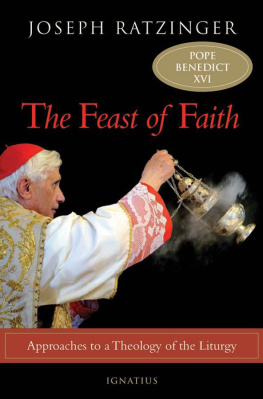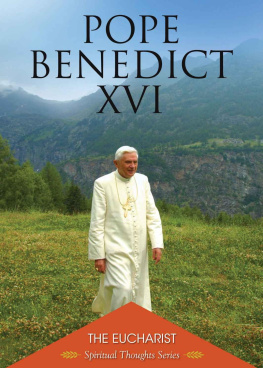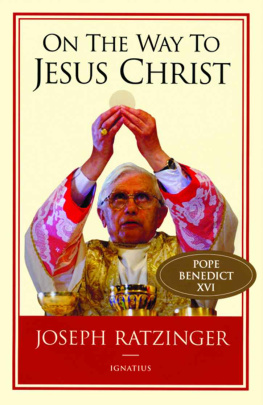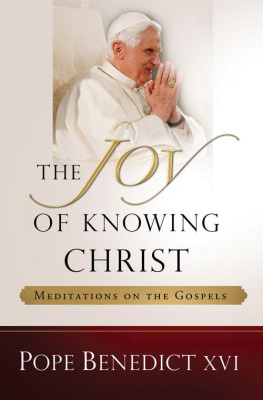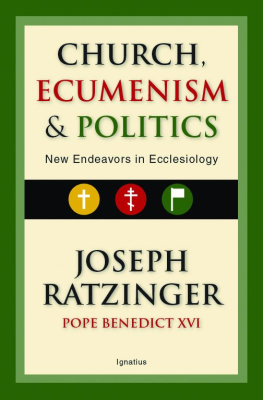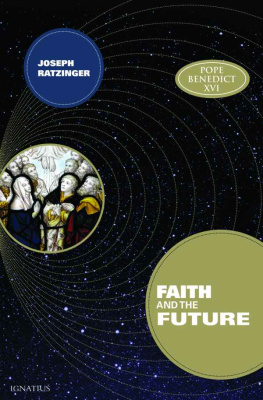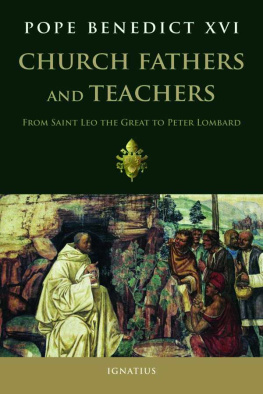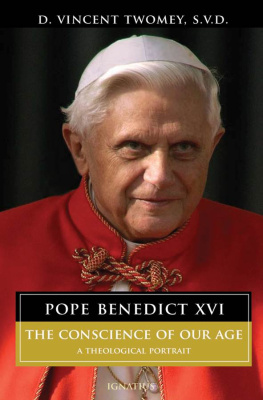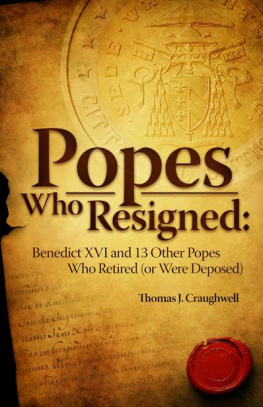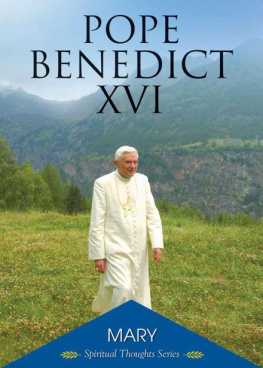Benedict XVI - The Ten Commandments (Catholic Foundation Stones series Book 6)
Here you can read online Benedict XVI - The Ten Commandments (Catholic Foundation Stones series Book 6) full text of the book (entire story) in english for free. Download pdf and epub, get meaning, cover and reviews about this ebook. year: 2014, publisher: St Pauls Publishing UK, genre: Religion. Description of the work, (preface) as well as reviews are available. Best literature library LitArk.com created for fans of good reading and offers a wide selection of genres:
Romance novel
Science fiction
Adventure
Detective
Science
History
Home and family
Prose
Art
Politics
Computer
Non-fiction
Religion
Business
Children
Humor
Choose a favorite category and find really read worthwhile books. Enjoy immersion in the world of imagination, feel the emotions of the characters or learn something new for yourself, make an fascinating discovery.

- Book:The Ten Commandments (Catholic Foundation Stones series Book 6)
- Author:
- Publisher:St Pauls Publishing UK
- Genre:
- Year:2014
- Rating:5 / 5
- Favourites:Add to favourites
- Your mark:
- 100
- 1
- 2
- 3
- 4
- 5
The Ten Commandments (Catholic Foundation Stones series Book 6): summary, description and annotation
We offer to read an annotation, description, summary or preface (depends on what the author of the book "The Ten Commandments (Catholic Foundation Stones series Book 6)" wrote himself). If you haven't found the necessary information about the book — write in the comments, we will try to find it.
The Ten Commandments (Catholic Foundation Stones series Book 6) — read online for free the complete book (whole text) full work
Below is the text of the book, divided by pages. System saving the place of the last page read, allows you to conveniently read the book "The Ten Commandments (Catholic Foundation Stones series Book 6)" online for free, without having to search again every time where you left off. Put a bookmark, and you can go to the page where you finished reading at any time.
Font size:
Interval:
Bookmark:

The Commandments are not chains that bind humans, but an antidote to the seductions,the passions, the unfettered desires that debase existence and make it empty. Placed in the right perspective, these laws are therefore to be considered as essential references for a life project directed to responsibility, fidelity and love. They are based on solid and enduring values that generate true freedom and the joy of living.

CONTENTS
your neighbour as yourself
PREFACE
In addressing the theme of the Commandments and of moral behaviour, the fundamental perspective in which Benedict XVI invites us to enter is first of all the following:
Contrary to the interpretation made by modern culture which tends to see in the Decalogue, as well as in the many rules and precepts of the Church, purely and simply a sequence of prohibitions the law of God is not to be seen as a concentrate of noes that are an end in themselves, but as the door of access to the great yes that opens up to God and to life. The Commandments are not chains that bind humans, but an antidote to the seductions, the passions, the unfettered desires that give the illusion of a limitless freedom, while in reality are false conquests that debase existence and make it empty. Placed in the right perspective, these laws are therefore to be considered as essential references for a life project directed to responsibility, fidelity and love, and therefore based on solid and enduring values that generate true freedom and the joy of living.
The law of God, in other words, indicates the road to take in order to act well and realize ones vocation, avoiding the very real risk of groping in the dark, pursuing mirages and ultimately ruining ones life. That is, the observance of the Commandments helps us to purify and renew ourselves interiorly, in order to recognize the will of God, and, in the gift of Gods love, progress towards the destiny reserved for each one of a good and happy life.
The preliminary condition for all this to happen is the measure with which one is able to listen to, and let oneself be transformed by, the Word of God and to live in a complete way according to the gospel, fixing ones gaze on the model that is Jesus. The moral conduct of the Christian, in fact, is nothing but the mirror of the Christians life of faith, of his or her meeting and experience of Christ in thought, in the sacraments and in deeds, nourished by grace and sustained by the action of the Holy Spirit.
The more one lives in intimacy with Christ and in the fullness of ecclesial communion, the more is one capable of going beyond ones constitutive weaknesses, of opening ones heart to receive the mercy and pardon of God; of putting oneself in the condition of fighting the slavery of sin and facing the daily challenges of spiritual combat against the forces of evil that are always vigilant both within us and without. Obedience to the commandments and the exercise of the Christian virtues are precisely the stairs that lead us to this perfecting of ourselves and to an ever more authentic imitation of Christ, to a moral behaviour that is its natural reflection, finding expression in righteous conduct, doing good and tending to peace. This is also the primary path towards sanctity: a summit accessible not only to great climbers but also to common travellers, since it does not consist in accomplishing extraordinary works, but in persevering in walking with Christ toward the fullness of a new life, one placed entirely under the banner of love.
The original function of the Decalogue Benedict XVI emphasizes finds therefore in Christ its fulfilment and its greatness as the way of perfection, the living and personal synthesis of perfect liberty in total obedience to the will of God. Christ is presented as the model of every authentic moral behaviour and from him the Christian receives the charge to follow: not slavishly but in an active way, sharing in his divine life itself and drawing from his grace so as to be supported in the fulfilment of his vocation.
Inserted here are all the great moral themes that continually subject Christians to a severe test in their confrontation with a society that often rejects, manipulates or slows down respect for the sacredness and inviolability of human life, from conception until death; or proposes a vision of sexuality and of the family that ends up perverting the essence of love and hurting the dignity of marriage; or still does not recognize in fact the principles of the law engraved by the Creator in the order of nature and of the ethical message inscribed in the heart of every man and woman. These are serious problems that demand the maturing of a staunch moral conscience, the scrupulous observance of the norms that regulate the moral life and a strong commitment to counter every attempt in the opposite direction (abortion, euthanasia, instrumental use of science, biological manipulations, etc.) and against every pretence of the State to set itself up, on the legislative plane, as the source and principle of ethics.
Not by chance has Benedict XVI included in his reflections on the one hand the discourse about the natural law as the only bulwark against the arbitrariness of power or the deceptions of ideological manipulation, and on the other the emphasis on the danger constituted by an invasive and destructive ethical relativism seen as a tragic obscuring of the collective conscience, inasmuch as it tends to cancel the pillars that make up the natural moral law.
For the Christian the defense of these principles and values that are not negotiable is found in the dynamism of the commandments of charity You shall love the Lord your God ... and You shall love your neighbor as yourself in which, as Benedict XVI reminds us, are summarized the whole of the divine law. In the Eucharist Christ gives himself as the living synthesis of this twofold commandment of love love for God and love for the brethren and from this inexhaustible font the Christian draws the strength to live with fidelity his relation of love with God and to open himself generously to his neighbour, in the service of truth and charity, in the corporal and spiritual works of mercy, one of the first works of love that the Church has the mission to offer to mankind.
The educational crisis and the new evangelization also pass through this moral and ethical context, by reconstituting that which contributes to form or consolidate a responsibility and a coherence in life capable of witnessing to the truth and to the good and, indirectly also, to building up a society wherein each one is safeguarded in his or her liberty and dignity as a human being.
Giuliano Vigini
1
THE LAW OF GOD
Not prohibitions, but yes to God
We can say that also in our time we need to say no to the widely prevalent culture of death.
It is an anticulture manifested, for example, in drugs, in the flight from reality to what is illusory, to a false happiness expressed in deceit, fraud, injustice and contempt for others, for solidarity, and for responsibility for the poor and the suffering; it is expressed in a sexuality that becomes sheer irresponsible enjoyment, that makes the human person into a thing, so to speak, no longer considered a person who deserves personal love which requires fidelity, but who becomes a commodity, a mere object.
Let us say no to this promise of apparent happiness, to this pompa of what may seem to be life but is in fact merely an instrument of death, and to this anticulture, in order to cultivate instead the culture of life. For this reason, the Christian yes, from ancient times to our day, is a great yes to life. It is our yes to Christ, our yes to the Conqueror of death and the yes to life in time and in eternity.
Font size:
Interval:
Bookmark:
Similar books «The Ten Commandments (Catholic Foundation Stones series Book 6)»
Look at similar books to The Ten Commandments (Catholic Foundation Stones series Book 6). We have selected literature similar in name and meaning in the hope of providing readers with more options to find new, interesting, not yet read works.
Discussion, reviews of the book The Ten Commandments (Catholic Foundation Stones series Book 6) and just readers' own opinions. Leave your comments, write what you think about the work, its meaning or the main characters. Specify what exactly you liked and what you didn't like, and why you think so.

